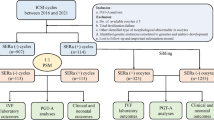Abstract
Purpose
The present study aimed to gather information on the impact of Alpha/European Society of Human Reproduction and Embryology (ESHRE) consensus regarding oocytes with aggregates of smooth endoplasmic reticulum (SERa) on in vitro fertilization outcome. In particular, we investigated if patients undergoing intracytoplasmic sperm injection (ICSI) and whose oocytes are discarded due to SERa have a higher chance of embryo transfer cancellation compared to patients without SERa oocytes.
Methods
This is a nested case–control study drawn from the cohort of women referring for in vitro fertilization with ICSI. Cases were patients showing at least one oocyte with SERa at the time of injection. Controls were subsequent patients showing no SERa oocytes and matched ratio 1:1 for age, clinical indication to in vitro fertilization (IVF), and body mass index. The main outcome was the rate of embryo transfer cancellation.
Results
The percentage of women experiencing a transfer cancellation (absence of suitable oocytes or viable embryos) in their ICSI cycle were significantly higher in cases (18 %) compared to controls (8 %) (p = 0.02); however, adjusted odds ratio for FSH and number of SERa oocytes, of follicles, of retrieved oocytes, and of inseminated oocytes were not statistically significant.
Conclusions
We have shown that the exclusion of SERa oocytes from ICSI cycles causes an increased frequency of transfer cancellation. This effect is mostly due to the reduced number of available oocytes after exclusion of SERa oocytes.

Similar content being viewed by others
References
Vanblerkom J. Occurrence and developmental consequences of aberrant cellular-organization in meiotically mature human oocytes after exogenous ovarian hyperstimulation. J Electron Microsc Tech. 1990;16(4):324–46.
Serhal PF, Ranieri DM, Kinis A, Marchant S, Davies M, Khadum IM. Oocyte morphology predicts outcome of intracytoplasmic sperm injection. Hum Reprod. 1997;12(6):1267–70.
Rienzi L, Vajta G, Ubaldi F. Predictive value of oocyte morphology in human IVF: a systematic review of the literature. Hum Reprod Update. 2011;17(1):34–45.
Sa R, Cunha M, Silva J, Luis A, Oliveira C, da Silva JT, et al. Ultrastructure of tubular smooth endoplasmic reticulum aggregates in human metaphase II oocytes and clinical implications. Fertil Steril. 2011;96(1):143–9.
Hattori H, Nakamura Y, Nakajo Y, Araki Y, Kyono K. Deliveries of babies with normal health derived from oocytes with smooth endoplasmic reticulum clusters. J Assist Reprod Genet. 2014;31(11):1461–7.
Otsuki J, Okada A, Morimoto K, Nagai Y, Kubo H. The relationship between pregnancy outcome and smooth endoplasmic reticulum clusters in MII human oocytes. Hum Reprod. 2004;19(7):1591–7.
Ebner T, Moser M, Shebl O, Sommerguber M, Tews G. Prognosis of oocytes showing aggregation of smooth endoplasmic reticulum. Reprod Biomed Online. 2008;16(1):113–8.
Akarsu C, Caglar G, Vicdan K, Sozen E, Biberoglu K. Smooth endoplasmic reticulum aggregations in all retrieved oocytes causing recurrent multiple anomalies: case report. Fertil Steril. 2009;92(4):1496e1–3.
Alpha Scientists in Reproductive Medicine and ESI. The Istanbul consensus workshop on embryo assessment: proceedings of an expert meeting. Hum Reprod. 2011;26(6):1270–83.
Mateizel I, Van Landuyt L, Tournaye H, Verheyen G. Deliveries of normal healthy babies from embryos originating from oocytes showing the presence of smooth endoplasmic reticulum aggregates. Hum Reprod. 2013;28(8):2111–7.
Van Beirs N, Shaw-Jackson C, Rozenberg S, Autin C. Policy of IVF centres towards oocytes affected by Smooth Endoplasmic Reticulum aggregates: a multicentre survey study. J Assist Reprod Genet. 2015;32(6):945–50.
Benaglia L, Bermejo A, Somigliana E, Faulisi S, Ragni G, Fedele L, et al. In vitro fertilization outcome in women with unoperated bilateral endometriomas. Fertil Steril. 2013;99(6):1714–9.
Kuwayama M. Highly efficient vitrification for cryopreservation of human oocytes and embryos: the Cryotop method. Theriogenology. 2007;67(1):73–80.
Shaw-Jackson C, Van Beirs N, Thomas A-L, Rozenberg S, Autin C. Can healthy babies originate from oocytes with smooth endoplasmic reticulum aggregates? A systematic mini-review. Hum Reprod. 2014;29(7):1380–6.
Author information
Authors and Affiliations
Corresponding author
Ethics declarations
Conflict of interest
The authors declare that they have no conflict of interest.
Additional information
Capsule The exclusion of SERa oocytes from ICSI cycles causes an increased frequency of transfer cancellation.
Rights and permissions
About this article
Cite this article
Restelli, L., Delle Noci, S., Mangiarini, A. et al. The impact of Alpha/ESHRE consensus regarding oocytes with aggregates of smooth endoplasmic reticulum (SERa) on in vitro fertilization outcome. J Assist Reprod Genet 32, 1629–1635 (2015). https://doi.org/10.1007/s10815-015-0583-2
Received:
Accepted:
Published:
Issue Date:
DOI: https://doi.org/10.1007/s10815-015-0583-2




